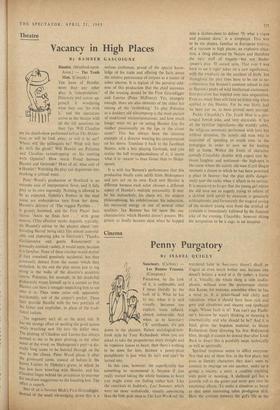Theatre
Vacancy in High Places
By BAMBER GASCOIGNE Peter Wood's production at Stratford is an extreme case of interpretative fever, and it falls prey to its own ingenuity. Nothing is allowed to be as expected. Ophelia's flowers in the mad scene are embroideries torn from her dress. Hamlet's delivery of 'The rugged Pyrrhus . . is grossly hammed, and the First Player then recites 'Anon he finds him . . .' with great reserve. (This effective stroke depends. typically. on Hamlet's advice to the players about 'out- heroding Herod' being cut.) The almost unavoid- able and charming joke in Gertrude's 'Thanks, Guildenstern and gentle Rosencrantz' is pointedly omitted—solely, it would seem, because it is familiar. None of these touches would matter if they remained genuinely incidental, but they constantly detract from the scenes which they embellish. In the end the play seems just to tag along in the wake of the director's eccentric course. Polonius, for example, in his death-fall elaborately wraps himself up in a curtain so that Hamlet can have a struggle unpacking him to see who it is. Then some coins roll, apparently accidentally, out of the corpse's pocket. These later provide Hamlet with the two portraits of his father and stepfather, in place of the tradi- tional lockets.
The ingenuity isn't all on the debit side. It has the strange effect of spoiling the good scenes while breathing new life into the duller ones. The plotting of Claudius and Laertes has always seemed tc me to be pure plotting, in the other sense of the word, on Shakespeare's part--a dis- mally long scene to be hurried through on the Way to the climax. Peter Wood places it after the graveyard scene, instead of before it. He leaves Laertes by Ophelia's grave, in which he has just been brawling with Hamlet, and has Claudius linger behind the procession to murmur his insidious suggestions to the kneeling boy. The effect is superb.
Best of all is Newton Blick's First Gravedigger. Instead of the usual rib-nudging clown this is a
serious craftsman, proud of the special know- ledge of his trade and offering the facts about the relative putrescence of corpses as a matter of sober interest. It is typical of the perverse 'odd- ness of this production that the chief successes of the evening should be the First Gravedigger and Laertes (Peter McEnery). Yet, strangely enough, there are also elements of the oldest hat among all the 're-thinking.' To play Polonius as a doddery old nincompoop is the most ancient of traditional misinterpretations; and how much longer must we go on seeing Hamlet kiss his mother passionately on the lips in the closet scene? This has always been the extreme example of a director wearing his interpretation on his sleeve. Translate it back to the Jacobean theatre, with a boy playing Gertrude, and you realise the full wrongheadedness of it; it seems what it is--nearer to Jean Genet than to Shake- speare.
It is with lan'Bannen's performance that this production finally casts adrift from Shakespeare and sets sail on its own. Each new Hamlet is different because each actor chooses a different aspect of Hamlet's multiple personality. It may be his melancholy, his sharp wit, his student philosophising, his exhibitionism, his indecision, his mercurial energy or one of several other qualities. Ian Bannen has hit upon the one characteristic which Hamlet doesn't possess. His prince, as finally became clear when he hopped
into a clothes-chest to deliver '0, what a rogue and peasant slave,' is a simpleton. This was to be the drama, familiar in European history, of a vacuum in high places; an explosive situa- tion, a thing abhorred by Nature and therefore the very stuff of tragedy—but not Shake- speare's play. '0 cursed spite, That ever I was born to set it right' takes on a new significance, with the emphasis on the accident of birth; but throughout the play lines have to be cut to ac- commodate Ian Barmen's constant refusal to rise to Hamlet s peaks of wild intellectual excitement. Interpretation has toppled over into amputation. Even so, many lines still have an ironic ring when applied to this Hamlet. For he was likely, had he been put on, to have proved most unroyal.
Paddy Chayefsky's The Tenth Man is a pro- longed Jewish joke, and very enjoyable. It has all the familiar ingredients—the worldly rabbi, the religious ceremony performed with love but without attention, the saintly old man who is suspected of spending so much time in the synagogue in order to save on his heating bill at home. Within the limits of character comedy Chayefsky shuttles with expert ease be- tween laughter and sentiment--the high-spot is the scene where the saintly old man (Cyril Shaps) recounts a dream in which he has been promised a place in heaven—but the play drifts danger- ously near the rocks when it affects to be serious. It is necessary to forget that the young girl whom the old men are so eagerly trying to relieve of a dyhhuk (evil spirit) by exorcism is genuinely schizophrenic, and fortunately the magical saving of the modern young man from the d.yhbuk of cynicism is immediately followed by the funniest joke of the evening. Chaycfsky, however strong the temptation to be a sage, is no amateur.














































 Previous page
Previous page